As an international retailer with operations in different countries and a variety of businesses and roles, diversity is an essential part of who we are. We value the unique characteristics and capabilities of each employee, as we believe that the sum of individual differences strengthens teams, increases the capacity to innovate, and contributes towards being an employer that is representative of the communities of which we are a part.
|
|
Age group |
|
Gender |
|
Total |
||||||||||
|---|---|---|---|---|---|---|---|---|---|---|---|---|---|---|---|---|
|
|
< 30 |
|
30-50 |
|
>50 |
|
Women |
|
Men |
|
|||||
|
|
|
|
|
# |
|
% |
|
# |
|
% |
|
||||
Group |
|
36,569 |
|
86,283 |
|
17,006 |
|
106,326 |
|
76.0% |
|
33,532 |
|
24.0% |
|
139,858 |
Portugal |
|
9,551 |
|
19,185 |
|
6,697 |
|
22,729 |
|
64.1% |
|
12,704 |
|
35.9% |
|
35,433 |
Poland |
|
19,311 |
|
58,720 |
|
10,252 |
|
75,235 |
|
85.2% |
|
13,048 |
|
14.8% |
|
88,283 |
Colombia |
|
7,636 |
|
8,236 |
|
44 |
|
8,211 |
|
51.6% |
|
7,705 |
|
48.4% |
|
15,916 |
Slovakia |
|
46 |
|
123 |
|
9 |
|
104 |
|
58.4% |
|
74 |
|
41.6% |
|
178 |
Czechia |
|
25 |
|
19 |
|
4 |
|
47 |
|
97.9% |
|
1 |
|
2.1% |
|
48 |
Functional levels |
|
|
|
|
|
|
|
|
|
|
|
|
|
|
|
|
Strategic |
|
2 |
|
116 |
|
83 |
|
62 |
|
30.8% |
|
139 |
|
69.2% |
|
201 |
Managerial |
|
251 |
|
2,884 |
|
420 |
|
1,879 |
|
52.9% |
|
1,676 |
|
47.1% |
|
3,555 |
Operational |
|
36,316 |
|
83,283 |
|
16,503 |
|
104,385 |
|
76.7% |
|
31,717 |
|
23.3% |
|
136,102 |
In 2024 we had 139,858 employees, of which 7.5% (1.3 p.p. more than in 2023) were of foreign nationality relative to the five main countries of operation. We have employees of 87 nationalities, spanning four different generations, making us a diverse, multicultural and multigenerational employer.
Because we aim to preserve these qualities, our HR management policies guide conscious behaviours aligned with the Code of Conduct, ensuring the practice and promotion of ethical standards based on fairness, non-discrimination and equal opportunities, regardless of origin, gender, sexual orientation, religion, age, marital status, family situation, nationality, ethnicity, disability, political or ideological beliefs, trade union membership or any other criteria at all levels of the organisation and for all employees. We have also established monitoring routines that allow us to validate and ensure compliance and consistency with these policies.
An example of this is a project developed by Biedronka in 2024 that included an assessment of HR practices and training given to the teams responsible for these processes, aimed at raising awareness of the issue of diversity and inclusion and topics such as unconscious bias. Also in 2024, the Company signed in Poland the Diversity Charter, coordinated by Forum Odpowiedzialnego Biznesu (the Responsible Business Forum), reinforcing its commitment to non-discrimination and policies that continue to promote diversity and inclusion.
As a result of the work that we have carried out in this area, the Financial Times and the online platform Statista acknowledged the Jerónimo Martins Group as a Leader in Diversity for the second consecutive year.
We were also distinguished as one of the 100 companies worldwide with the best diversity and inclusion practices by the FTSE Diversity & Inclusion Index, organised by FTSE Russel. Among the more than 15,500 companies analysed worldwide, we rank 46th and are the only company based in Portugal, as well as the only one in the “supermarkets and convenience stores” sector present in the index.
Gender equality
Our commitment to gender equality is reflected in policies and initiatives to ensure balanced and equitable work environments, in which the opportunities given to men and women are based, above all, on merit.
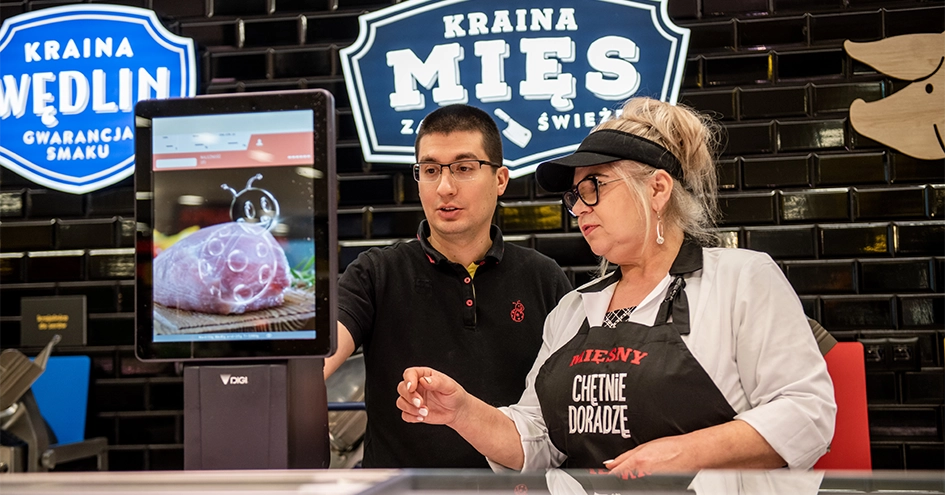
We seek to ensure gender balance at all organisational levels and in all people management processes, and the pay parity that we have achieved in the main countries in which we operate demonstrates the importance we place on these matters.
Our workforce is predominantly made up of women (76.0%), similar to what is observed in the food distribution sector, and this is also true in leadership and management positions. In 2024, 69.1% of management positions and 51.7% of leadership positions (Managerial and Strategic functional levels) were held by women, and 40% of the members of the Group’s Managing Committee were women.
Representativeness and employee life cycle |
|
2024 |
|
2023 |
|
2022 |
||||||||
|---|---|---|---|---|---|---|---|---|---|---|---|---|---|---|
Management positions held by women1 |
|
69.1% |
|
67.4% |
|
66.9% |
||||||||
Entry-level positions held by women2 |
|
76.7% |
|
77.0% |
|
78.8% |
||||||||
Revenue-generating functions carried out by women3 |
|
75.4% |
|
73.1% |
|
72.6% |
||||||||
Hires taken by women |
|
69.2% |
|
68.1% |
|
66.9% |
||||||||
Promotions given to women |
|
68.2% |
|
73.6% |
|
78.2% |
||||||||
Terminations taken by women |
|
68.0% |
|
67.6% |
|
67.0% |
||||||||
|
||||||||||||||
Gender pay ratio by country and most representative Company in each country1 |
|
2024 |
|
2023 |
|
2022 |
||||
|---|---|---|---|---|---|---|---|---|---|---|
Group |
|
98.5% |
|
98.5% |
|
97.8% |
||||
Portugal |
|
99.5% |
|
100.2% |
|
100.1% |
||||
Pingo Doce |
|
99.9% |
|
|
|
|
||||
Poland |
|
98.1% |
|
97.9% |
|
96.5% |
||||
Biedronka |
|
98.1% |
|
|
|
|
||||
Colombia |
|
98.7% |
|
98.0% |
|
99.7% |
||||
Ara |
|
98.7% |
|
|
|
|
||||
|
||||||||||
Our strategy is defined in the Plan for Equality between Women and Man, the progress on which is reported and reviewed annually, and is supported by a set of internal and external assessment tools. Describing an action plan with seven dimensions and fourteen measures aligned with the guidelines of the Commission for Equality in Work and Employment (CITE), a Portuguese entity under the oversight and guidance of the Ministries of Parliamentary Affairs and Labour, Solidarity and Social Security, the Plan aims to guide us in implementing four pillars of action:
- Formalising equality between women and men in policies and procedures through guidelines that enshrine our commitment to human rights and the prevention of discrimination based on any diversity factor, including gender.
- Monitoring gender indicators, analysing internal practices and indicators on a quarterly basis throughout the employee’s life cycle, in order to understand the main challenges and act on them, as well as monitoring the investors, analysts and main sustainability indices that assess our performance in this area.
- Facilitating the integration of professional, personal and family life with measures to support parenting, family wellbeing, situations of vulnerability and/or social emergency, as well as support for communities.
- Raising of awareness and capacity-building for equality between women and men within and outside the Group, sharing information and providing training on the Code of Conduct and fundamental rights, such as equal opportunities and the prohibition of discrimination, establishing external partnerships, and participating in working groups.
To promote the internal and external dissemination of good gender equality practices, we maintain institutional cooperation relationships with external entities specialised in the matter. Our affiliation with the LEAD Network, whose purpose is to enhance diversity in leadership, particularly female leadership, has enabled us to participate in several awareness-raising and best practice sharing forums, in a mentoring programme aimed at the personal and professional development of mentees from different companies, and in an inclusive leadership programme, the objective of which is to provide tools for promoting an inclusive work environment. In 2024, we began the second affiliation cycle, with the Holding Company and Biedronka represented in the various programmes.
We also continue to participate in the “SDG 5 Gender Equality” working group, led by GRACE – Responsible Companies (an entity comprising over 30 organisations in Portugal that work together to respond to these challenges), and in iGen – Business Forum for Equality, a CITE initiative that seeks to establish itself as an ambassador for equality and as a specialised centre of expertise in this field.
In 2024, the Group received the Equal Pay Seal, a distinction awarded by CITE, in recognition of good practices in promoting equal pay between women and men.
Multigenerational workforce
The generational diversity of our workforce is a critical success factor in ensuring the necessary skills and experience for the sustainability of our business and our leadership. We promote the hiring and creation of development opportunities for people of all age groups and encourage cooperation between different generations. In 2024, we hired 24,208 people under the age of 30 and 1,847 people over the age of 50.
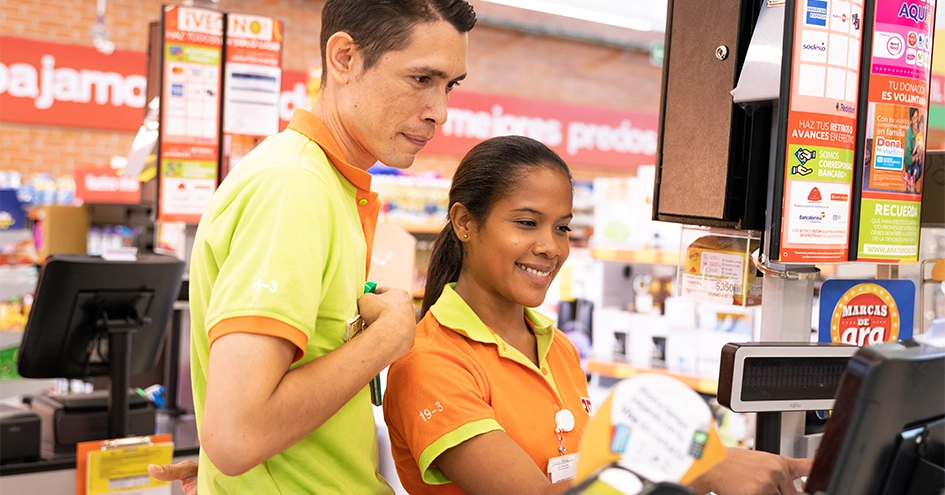
At Ara, the National Training Service (SENA – Serviço Nacional de Aprendizagem) programme is one of the main mechanisms for integrating young talent, with 675 people being hired in 2024.
During the Christmas holidays, Pingo Doce invites the children of employees aged between 16 and 25 to have a brief professional experience in the stores, and in the summer it offers an academy for young people to have the opportunity to get to know the business and develop their communication and interpersonal skills. These initiatives had 352 and 131 participants in 2024, respectively.
Biedronka and Hebe have training programmes in place aimed at bringing together the different generations comprising the teams, focusing on intergenerational communication, cooperation, feedback and a culture of appreciation. In 2024, a total of 56 people were trained in these topics.
To capture the best that each generation has to offer to the rest, we held the JM Talks, sessions to inspire and for business knowledge sharing between experienced and junior leaders of the Group, in which 547 people participated. Biedronka implemented a reverse mentoring model, through which young people supported 12 seasoned employees in the development of technological and intergenerational management skills.
Inclusion of minorities
We adopt an inclusive approach towards the communities to which we belong, creating employment, training and development opportunities also for those who face disadvantages in accessing the labour market. We do this through innovative programmes, methodologies and infrastructures, actively working to increase recruitment opportunities and facilitate their integration.
|
|
Women |
|
Men |
|
Total |
||||||
|---|---|---|---|---|---|---|---|---|---|---|---|---|
|
|
# |
|
% of |
|
# |
|
% of |
|
# |
|
% of the workforce |
Group |
|
1,597 |
|
1.5% |
|
685 |
|
2.0% |
|
2,282 |
|
1.6% |
Portugal |
|
495 |
|
2.2% |
|
365 |
|
2.9% |
|
860 |
|
2.4% |
Poland |
|
1,051 |
|
1.4% |
|
276 |
|
2.1% |
|
1,327 |
|
1.5% |
Colombia |
|
51 |
|
0.6% |
|
44 |
|
0.3% |
|
95 |
|
0.6% |
Incluir (Include) Programme, launched in 2015 in Portugal, aims to create training and hiring opportunities for people with disabilities and/or impairments, migrants, refugees and people at social risk. The programme follows a methodology that is customised to each person and adapted to the roles available in each business area, encompassing training in psychosocial skills and practical on-the-job training, as well as adaptation of the workstation (physical or functional).
Based on a network of 124 partner institutions that support us in identifying potential candidates, the process begins with the application, followed by the recruitment and selection process, carried out by an internal technical team specialised in rehabilitation and social integration, which consists of an analysis of the skills profile and motivations of each applicant. An individual plan is then created, which may include training, and each candidate is assigned a case manager who supports them throughout the entire process.
The initial stage of the training lasts two weeks and takes place at the Incluir Centres in Lisbon and Porto. The first week is dedicated to learning interpersonal skills. The second week is spent in the simulation stores, a space that allows candidates to simulate the main operational tasks that they will perform in a store in the future (such as replenishment, checkout and counter service), at a comfortable and safe environment. Each Incluir Centre was built with all types of diagnoses, disabilities and impairments in mind. The Centres have lifting platforms, signage and fonts that make it easier for blind or partially-sighted people to read, tactile maps of the spaces and text transcription into Braille, colour codes (for people who are colour blind), use of soft colours and adjustable lights (for greater comfort for people with autism and Asperger syndrome), among other adaptations. The Incluir Centres are spaces open to the community and feature exhibitions of works of art created by people with disabilities from different institutions.
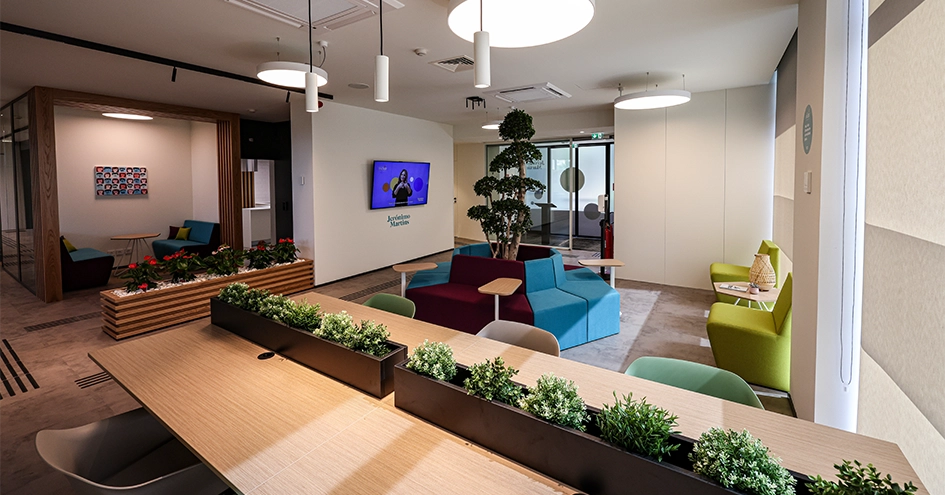
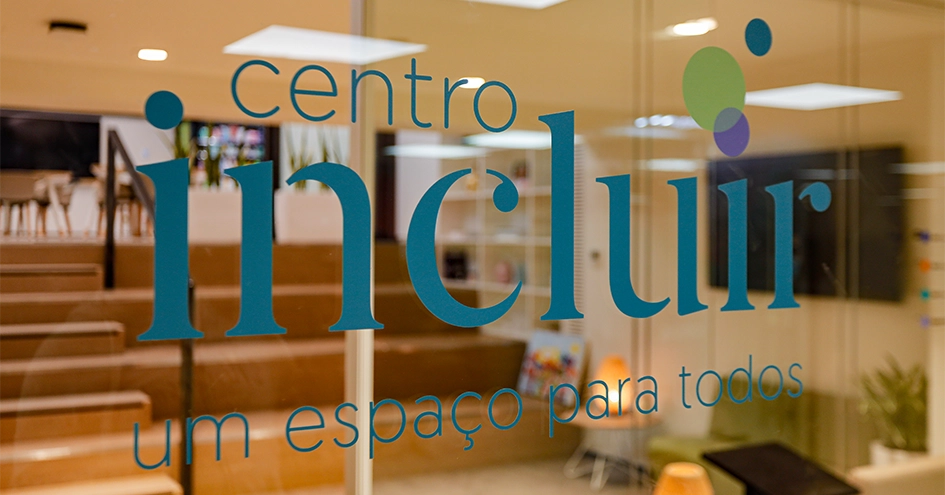
The second stage of training lasts ten weeks and takes place in a real work context, with the support of tutors and the technical team of the Incluir Programme. In 2024, we had 80 tutors, who received initial training to prepare them to welcome, integrate, support and maximise the potential of the trainees they take under their wing. Tutors also receive “Liderança para a Diferença” (Leadership for the Difference) training, which was specifically created to raise awareness among leaders and give them tools to manage difference, welcoming, supporting and developing each person, without unconscious bias. By 2024, this training had covered 4,546 leaders.
Since its launch in 2015, the Incluir Programme has reached 2,059 people. In 2024, the programme saw 350 people involved, 92 of whom were hired.
As a result of the work carried out in Portugal, since 2021 Recheio and the Holding Company have been an Inclusive Employer Brand, a distinction awarded by the Portuguese Institute of Employment and Professional Training (IEFP)1, with the Group’s Holding Company having risen to the level of “Excellence” in 2023. Pingo Doce has been an Inclusive Employer Brand since 2023 and, in 2024, was distinguished as Master Diversity, Equity and Inclusion by Distribuição Hoje magazine.
In 2024, Biedronka strengthened its strategy of integrating people with disabilities and/or impairments with the creation of a self-checkout support function, the purpose of which is to support consumers in using automatic checkouts and promote quality customer service. At the end of the year, the Company had 1,310 self-checkout assistants distributed across 427 stores (11.4% of the Biedronka network).
To ensure the onboarding and integration of these employees, store managers and senior operations managers receive training on diversity and inclusion topics, including minimisation of unconscious bias. Biedronka conducted a diagnostic on the Dla Nas intranet and its chatbot to assess the level of accessibility and introduce the necessary improvements. Both tools achieved the ‘AA’ level of compliance, the second highest score.
The Companies in Poland have continued to focus on integrating Ukrainian employees. In 2024, we had 4,208 people of Ukrainian nationality in the Group, 98.8% of whom in Poland. To facilitate their journey within the organisation, Biedronka and Hebe have the following mechanisms in place:
- a team responsible for recruiting and integrating migrants;
- content and recruitment channels adapted for the Ukrainian population;
- onboarding, communication, and occupational health and safety materials and operational processes, such as store checkout, in Ukrainian;
- internal channels with useful information in Ukrainian, including a chatbot to support employees;
- support for the immigration process;
- language training in Polish for Ukrainian employees and in Ukrainian for Polish coordinators.
JMA has a high need for hiring employees of non-Portuguese nationality, so investing in the integration of immigrant employees is a constant commitment. The Company structured a new team dedicated to recruiting and integrating these employees, and it has developed an integrated approach that, among other aspects, includes training in Portuguese, mobility, and housing solutions, and legal and tax support. For foreign employees who are not employees who support seasonal agricultural campaigns, a practical welcome guide has been created in ten languages (including Thai, Hindi and Nepali) with essential information on health and safety at work and the cornerstones for good communication.
Creating opportunities for people who are at a disadvantage in accessing the job market because they are at social risk is another aspect of how we include minorities.
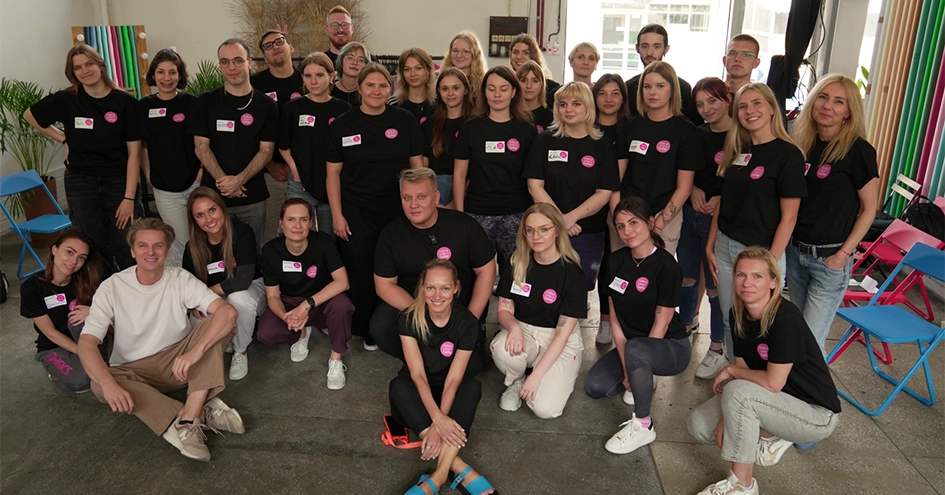
Biedronka and Hebe offer two-month internships in their stores to young adults who live or have lived in orphanages. The “Dobry start z Biedronką” (Good start with Biedronka) and “Odkryj Siebie Z Hebe” (Discover yourself with Hebe) initiatives offer young people their first professional experience, training in essential skills to succeed in the job market and individual support from mentors. This is a partnership with the One Day Foundation, and since its first edition there have already been 68 participants.
1 Criteria: (i) recruitment, professional development and advancement; (ii) job retention and return to work; (iii) accessibility (employees); (iv) services and relationships with the outside world (community and customers).
